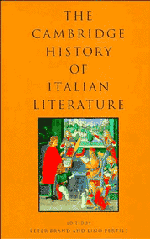Book contents
- Frontmatter
- Origins and Duecento
- The Trecento
- 4 Dante
- 5 Boccaccio
- 6 Petrarch
- 7 Minor writers
- The Quattrocento
- The Cinquecento
- The Seicento: Poetry, Philosophy and Science
- Narrative prose and theatre
- The Settecento
- The Age of Romanticism (1800–1870)
- The Literature of United Italy (1870–1910)
- The Rise and Fall of Fascism (1910–45)
- The Aftermath of the Second World War (1945–56)
- Contemporary Italy (since 1956)
- Bibliography
- References
4 - Dante
from The Trecento
Published online by Cambridge University Press: 28 March 2008
- Frontmatter
- Origins and Duecento
- The Trecento
- 4 Dante
- 5 Boccaccio
- 6 Petrarch
- 7 Minor writers
- The Quattrocento
- The Cinquecento
- The Seicento: Poetry, Philosophy and Science
- Narrative prose and theatre
- The Settecento
- The Age of Romanticism (1800–1870)
- The Literature of United Italy (1870–1910)
- The Rise and Fall of Fascism (1910–45)
- The Aftermath of the Second World War (1945–56)
- Contemporary Italy (since 1956)
- Bibliography
- References
Summary
When in 1313–14 it began to circulate in Italy, the Inferno must have taken its first Tuscan readers by surprise. Dante Alighieri was a Florentine exile, a sophisticated poet and intellectual who, some twenty years earlier, had published a slim volume, a love story in vernacular verse and prose, entitled Vita Nuova. He was also known as the author of many other poems in the vernacular (sonnets, canzoni, ballads) which had placed him at the forefront of a small group of young poets active in Tuscany in the 1290s. However, his main claim to fame was probably of a different nature: in the year 1300 he had been one of Florence's six Priors, the highest public officers in the Commune. But his political career had been dramatically interrupted in 1301, when as a White Guelf he had been banished from his native city. Since that year he had been living in exile, mainly in Northern Italy, producing the occasional canzone but apparently involving himself more with philosophy and politics than with poetry. In fact, in the previous two to three years he had written various open letters advocating the restoration of the Holy Roman Empire under the rule of a German monarch, Henry VII of Luxembourg – the same Henry who had vainly besieged Florence in the autumn of 1312 and had died ten months later, near Siena, without having achieved much for himself or the Empire.
- Type
- Chapter
- Information
- The Cambridge History of Italian Literature , pp. 37 - 69Publisher: Cambridge University PressPrint publication year: 1997



